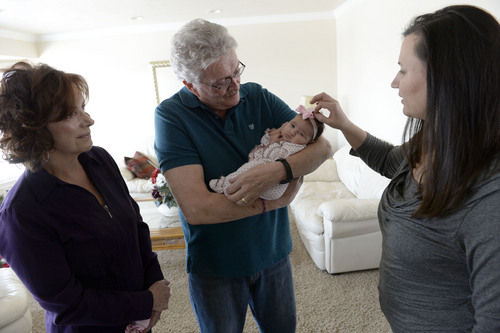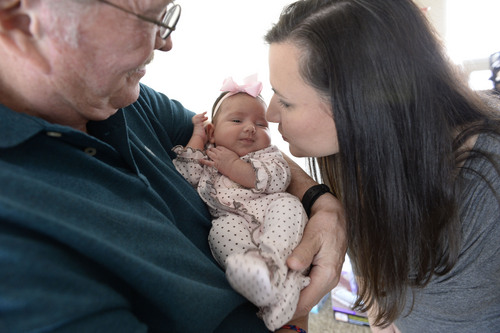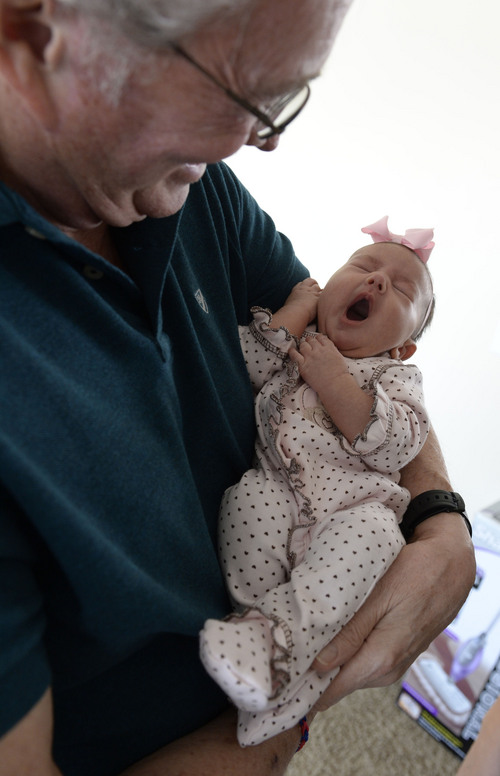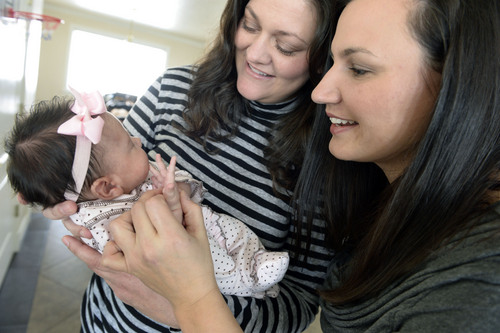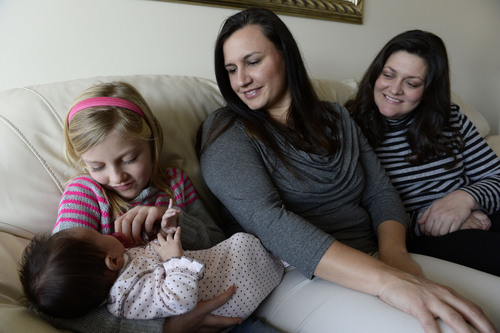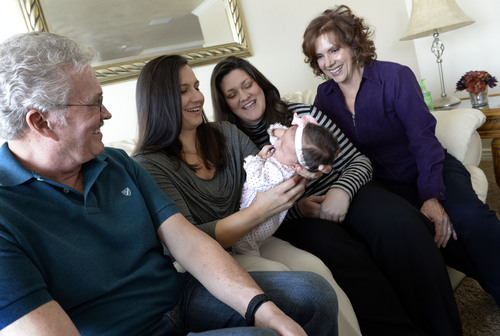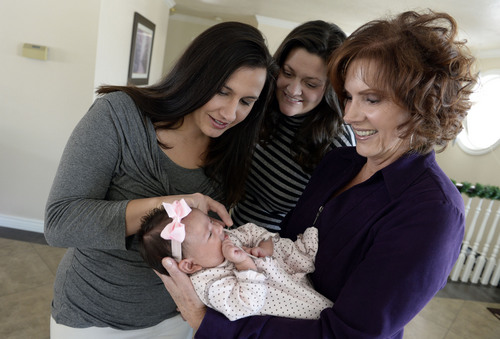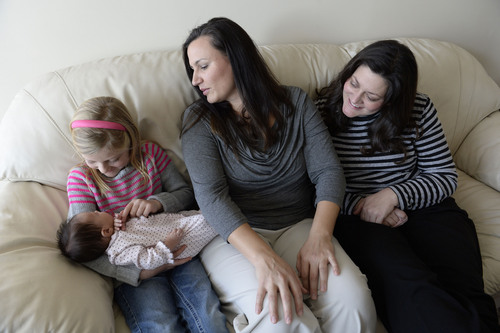This is an archived article that was published on sltrib.com in 2013, and information in the article may be outdated. It is provided only for personal research purposes and may not be reprinted.
Bonnie Whiteaker was a nervous wreck on Christmas Eve, the night her daughter decided to get married.
"It was like it was in a dream because I wanted this to happen so bad. It just seemed unreal that it was finally going to happen," she said.
Her 36-year-old daughter Amber Whiteaker, a new mother with her wife Robin Brown, wed at the courthouse in Farmington.
"When I woke up the next morning, the feeling was incredible … I felt like a weight had been lifted off my shoulders," Bonnie Whiteaker said. "I kept asking them, 'Do you feel different?' and they said, 'Yeah, a little.'"
The mother of two LGBT children, Whiteaker's protective instincts kick in when she thinks about them being discriminated against.
"It just weighs on you, these little things you don't even think about," she said. But legal marriage "was really a milestone, and I feel like it helps cement a relationship, helps them work harder."
Nearly 1,000 same-sex couples had wed in Utah as of Thursday, flocking to county clerk's offices and courthouses after a federal judge struck down the state's ban on gay marriage Dec. 20. Several parents of Lesbian, Gay, Bisexual or Transgender (LGBT) newlyweds, many of whom have a background in the family-oriented Church of Jesus Christ of Latter-day Saints, told The Tribune it was a turning point they never thought they'd see in Utah.
"When my son came out nine years ago, that was the first thing that came to mind — I'll never get to see him get married," said Allison Black of Pleasant View. Her son Joshua moved to New York City with his partner five years ago, and wed there in August.
"They just wanted to get away, where it wasn't an issue," Black said. "When two guys are walking down the street holding hands in New York, no one thinks about it."
Black still gets choked up when she remembers trying to protect her son from relentless school bullying that started in the second grade. She's hoping last week's ruling is part of a larger cultural shift making it easier to be an LGBT kid in Utah.
"This shows that it does get better," she said. "People are starting to stand up."
When Greg VanDyke first saw the news about the ruling, he thought it was some kind of early April Fool's joke. After confirming the news was real, he talked his stepdaughter into switching from a planned Washington state ceremony to a Utah courthouse wedding.
"It feels more secure for her and more official to us, I think," he said. VanDyke and his wife Emily were members of the Mormon church when daughter Elaine Ball came out to them.
"I remember being in my garden and thinking I had always believed in God and valued my membership in the LDS Church," said Emily VanDyke. "I could never imagine myself changing that dynamic, but here was this daughter who was challenging all those expectations."
The VanDykes would eventually leave the church, though many of their friends and family members remain part of it. While they've received plenty of warm congratulations on news of the nuptials, it's apparent to them not everyone is on board.
"We've lit up Facebook … [but] there are people whose silence is deafening," said Greg VanDyke. The lack of response from loved ones can be "really frustrating" and "a little painful."
The LDS Church was heavily involved with the effort to pass a similar ban known as Prop. 8 in California five years ago, and it publicly affirmed its support for Utah's Amendment 3 after the Dec. 20 ruling. The state of Utah, meanwhile, is appealing the ruling, and it plans to seek a stay of new same-sex marriages from the U.S. Supreme Court after an appeals court denied the request.
Lynette Kocherhans has also had both kinds of responses since her son Carson wed his longtime boyfriend on Dec. 22.
"You definitely see true colors," she said. "I'm not here to judge anyone … people can have their opinions, I'm not going to treat them any differently."
Parents of LGBT people, she said, go through their own "coming out" process, one that can start with grieving for an image of their children.
"You have to be looking at them through their own eyes. We have to adapt to what their dreams are," said Kocherhans, who proudly displays pictures at work and recently talked about her son's wedding at the doctor's office.
"For me, it was overwhelming he was actually able to marry his high school sweetheart after waiting a very long time," she said. "It was wonderful to be able to see the joy and the love they share, and have it recognized by the state they live in."
Barry Gomberg, who works as the Affirmative Action and Equal Opportunity director at Weber State University, was perhaps more prepared than many parents when his daughter Marina came out.
"My first comment was, 'Who's the lucky girl?'" he said. "It was more of a relief to realize that what had perhaps been making Marina so unhappy was the artificial life she'd had to lead up until then."
Marina and her now-wife Elenor Heyborne had a commitment ceremony four and a half years ago, but the legal weight of the official marriage changed things.
"It just wasn't quite the same thing," he said. "It did not hit me how different it would feel to be able to say Elenor was my daughter-in-law."
And, like parents of newlyweds the world over, it's also got him thinking about the possibility of more grandchildren.
Twitter: @lwhitehurst


